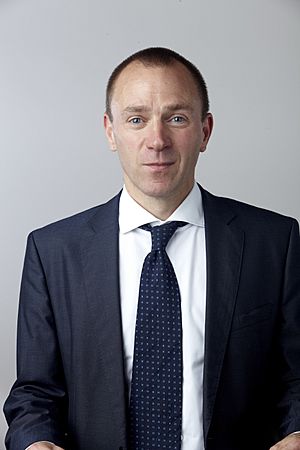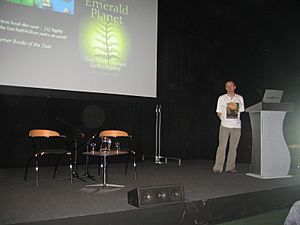David Beerling facts for kids
Quick facts for kids
David Beerling
|
|
|---|---|

David Beerling at the Royal Society admissions day in 2014
|
|
| Born |
David John Beerling
|
| Alma mater | University of Wales, College of Cardiff (BSc, PhD) |
| Known for | The Emerald Planet |
| Spouse(s) |
Juliette Dawn Fraser
(m. 2011) |
| Children | Joshua |
| Awards |
|
| Scientific career | |
| Fields |
|
| Institutions | |
| Thesis | The ecology and control of Japanese knotweed (Reynoutria japonica Houtt.) and Himalayan balsam (Impatiens glandulifera Royle.) on river banks in South Wales (1990) |
| Doctoral advisor | Ron Walter Edwards |
David John Beerling is a well-known British scientist. He studies how plants have changed Earth's climate and environment over millions of years. He is a professor at the University of Sheffield in the UK. He also leads a special research center focused on finding ways to fight climate change.
Contents
Learning and Early Research
David Beerling studied at the University of Wales, College of Cardiff. He earned his first degree in Botany (the study of plants) in 1987. Then, in 1990, he completed his PhD. His PhD research looked at two fast-growing, non-native plants: Japanese knotweed and Himalayan balsam. He studied where they grew, how they affected their environment, and how to control them.
Exploring Earth's Past and Future
Professor Beerling's research team explores big questions about plants. They want to know how plants first grew on land and how they shaped Earth's climate and air over time. They use clues from fossils, experiments, and computer models. Their discoveries help us understand today's global climate change issues.
How Plants Shaped Earth's Climate History
One of Beerling's important discoveries was about Earth's ancient atmosphere. He found evidence of a huge increase in CO₂ (carbon dioxide) in the air 200 million years ago. This happened during a time called the Triassic-Jurassic (Tr-J) boundary. This period had "super-greenhouse" conditions, meaning it was very hot. His work showed a link between this hot period and a major extinction event. This event was also linked to the breaking apart of the supercontinent Pangaea.
Before his work, the Tr-J extinction was not well understood. His research helped other scientists find more evidence of this carbon change worldwide. He also worked with a scientist from Yale University to understand why these changes happened.
Beerling also worked with James Hansen, a famous climate scientist. They looked at CO₂ levels and climate evidence from a more recent time, the Cenozoic era. Their goal was to figure out how much human-made CO₂ is too much for the climate. Their 2008 paper, called 'Target CO₂', made headlines. It warned that countries needed to cut carbon dioxide much more than planned.
Experiments with Ancient Plants and Environments
Beerling is a leader in a field called experimental palaeobiology. This means he uses modern experiments to answer questions about ancient plant life. For example, he studied 400-million-year-old fossils from the Rhynie chert. These fossils showed that early land plants, which didn't have roots, grew better with help from soil fungi. His team showed how high CO₂ levels in the ancient air, along with these fungi, helped plants grow stronger. This suggests that fungi were very important when plants first started to grow on land.
His team also studied ancient polar forests. These were forests that grew near the North and South Poles long ago. By doing experiments that copied the high CO₂ environments of the past, they learned how these forests lived. Their work changed old ideas about why polar forests lost their leaves. This research was even featured on BBC News.
Professor Beerling has written over 200 scientific papers. These have appeared in top journals like Science and Nature.
Sharing Science with Everyone
Beerling wrote a popular science book called The Emerald Planet: How plants changed Earth's history. This book explains how plants have shaped our planet's story. Many newspapers and journals praised the book. Famous author Oliver Sacks even called it his favorite non-fiction book of the year.
The Emerald Planet has been translated into three languages. It also inspired a three-part BBC Two TV series called How to Grow a Planet. Beerling was the scientific advisor for this show. The series helped many people learn more about plant science.
Looking at the History of Science
David Beerling is also interested in the history of science. He has written articles about this topic. For example, he wrote about how Isaac Newton thought about how water moves through plants. Newton had ideas about this over 200 years before other scientists fully explained it! This discovery was reported in magazines like Scientific American.
Funding Research
Beerling's research gets money from several important organizations. These include the Natural Environment Research Council (NERC) and The Royal Society. In 2012, he received a big grant from the European Research Council. This money helped him study how carbon dioxide affects Earth's ecosystems.
In 2015, he received £10 million to create the Leverhulme Centre for Climate change mitigation. This center aims to find new ways to fight climate change. One main idea they are exploring is called enhanced weathering. This process uses natural reactions to remove large amounts of CO₂ from the air. This helps cool the planet and also reduces ocean acidification, which harms sea life.
The center plans to use computer models, lab experiments, and large outdoor studies. They also look at how these solutions can be sustainable and how people will accept them. Beerling is very excited about this work. He believes it can make a big difference in removing greenhouse gases from the atmosphere.
Awards and Recognition
David Beerling has received many awards for his important work.
- In 2001, he won the Philip Leverhulme Prize for his excellent contributions to studying ancient plants and climates.
- In 2014, he was chosen as a Fellow of the Royal Society (FRS). This is a very high honor for scientists in the UK. The Royal Society recognized him for understanding how plants and the environment have changed together over the past 500 million years.
- In 2022, he became a Fellow of the Learned Society of Wales.
Personal Life
David Beerling is the son of Johnny Beerling, who used to be in charge of BBC Radio 1. David married Juliette Fraser in 2011, and they have a son named Joshua.


